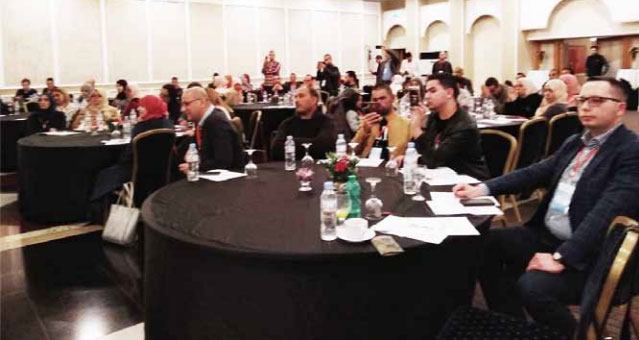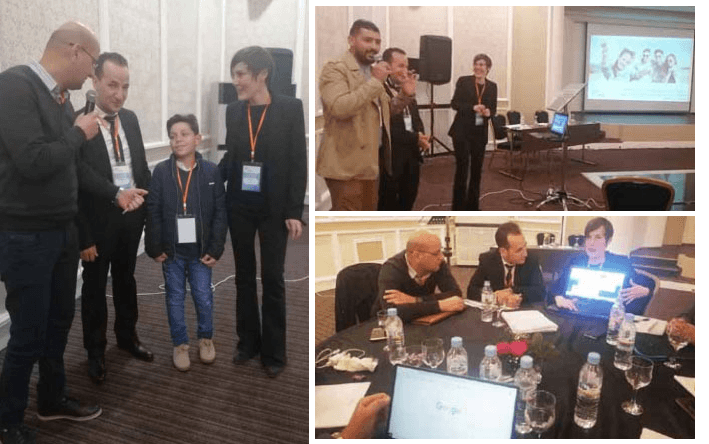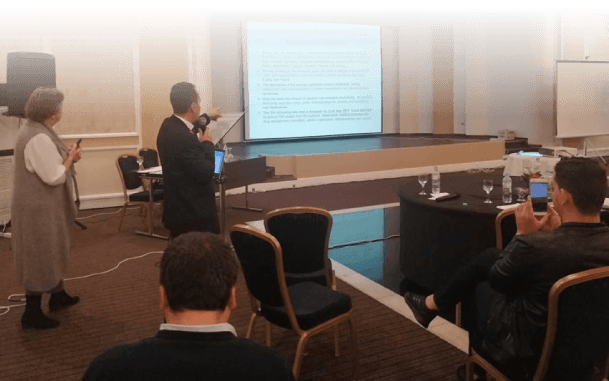
By Maria Ferron, Regional Patient Advocate Mediterranean & Maghreb Countries
I was very worried that the 2020 HAEi Regional Workshop Maghreb-North Africa was bound for disaster after experiencing many problems and difficulties in the organization. Then at the last minute, I was advised that Dr. Laurence Bouillet and Dr. Teresa Caballero would not be able to attend the Workshop because of the COVID-19 situation, which then led me to worry that fear of the novel coronavirus would result in many cancellations. But in the end, it seems that the patients’ fear of living with HAE without modern life-saving medication and the determination to come together and start solving their problems overcame all fear of the coronavirus and even of war. After the airport at Tripoli, Libya was bombarded, our participants from Libya had to travel 200 km to another airport to be able to leave the country!
In the end, the 2020 HAEi Regional Workshop Maghreb- North Africa took place 6-8 March at the Mercure Hotel in Algiers, Algeria. There were 80 attendees to the Workshop, 18 of whom were doctors. A representative of Takeda attended briefly on Friday afternoon.
I would especially like to thank Prof. Habib Douagui of the Algiers University of Medicine for his invaluable support and help in coordinating and organizing this meeting; he secured the High Patronage of the Minister of Health, Population and Hospital Reform for the Workshop. Many thanks also to Drs. Teresa Caballero (Spain) and Laurence Bouillet (France) who were finally able to address the Workshop via videoconference, and Professors Kamel Djenouhat (Algeria), Ahmed Elbousify (Libya), Agnes Hamzaoui (Tunisia), and Fatma Tritar (Tunisia) as well as Drs. Leith Belkahia (Tunisia), Khadija Moussayer (Morocco), and Miriam Kebe (Mauritania) for their lectures and their support and untiring efforts to help HAE patients in their respective countries. Finally, my thanks to the Board of Directors members Sarah L. Smith and Michal Rutkowski for attending in representation of HAE International.
After the Welcome on Friday afternoon, Michal Rutkowski gave a talk on “HAEi – Who we are and Global Overview”. After saying that HAE is very personal and that every HAE patient is different from the next, he explained the HAE International structure, global reach, the role of the Regional Patient Advocates and HAE International’s objectives and goals. He concluded by saying that the most important goal is to find motivated patient advocates and establish patient associations around the world. Many thanks to Prof. Ahmed Elbousify for translating Michal’s presentation.
Dr. Khadija Moussayer of Morocco then gave a talk on “Rare Disease Associations: What they do and benefits”, with a definition of rare disease and an overview of the situation in Morocco. The Friday afternoon session concluded with a lecture by Prof. Habib Douaguie on “National Algerian Plan to Manage HAE”; although there “is a bad and difficult situation [in Algeria] like all African countries” (for example, only fresh frozen plasma is available for treatment in Algeria), there is reason for hope, including “significant engagement of HAE International with our movement” and creation of the National Association of Patients with HAE, and there are proposed plans for improvement of care, for a 2020 Algerian (and Maghrebian) Walk in April, and for a network of HAE support.

On Saturday morning, we had the following Country Presentations:
- Morocco: Dr. Othmane Boumaalif
- Tunisia: Prof. Fatma Tritar, Dr. Leith Belkahia
- Algeria: Prof. Kamel Djenouhat – “Current State of Bradykinin Angioedema in Algeria”
- Libya: Prof. Ahmed Elbousify
- Mauritania: Dr. Mariam Kebe
In general, the situation in the Maghreb is very deficient:
- Morocco is making some progress, although HAE is still confused with allergy; its patient association, AMMAO, was legally registered in late 2018 and now has 50+ members, and the doctors receive help for diagnosis via CREAK (Grenoble, France).
- In Tunisia, the patient association, TuAOH, is in the process of registration. Still, there are only 30 confirmed cases out of an estimated 120 patients in the country (based on a 1/100,000 prevalence), and the only available medications are fresh frozen plasma, tranexamic acid and danazol.
- In Algeria there are 144 diagnosed patients out of an estimated 850 (based on 1/50,000), the patient association should be legally registered soon (after an unsuccessful attempt in 2005), but the only available treatment is fresh frozen plasma since danazol and tranexamic acid have to be brought from abroad.
- Libya is in an even worse situation, with only six diagnosed patients out of an estimated 230 (based on 1/30,000), and there is a lack of everything in the country.
- Finally, in Mauritania, where there should be 80-100 patients, there are no patients diagnosed, but there are now implicated physicians, and Dr. Kebe hopes that a Teledermatology pilot project they have in Mauritania to compensate for lack of specialists can be used as the basis for a similar project to identify HAE patients.
After a coffee break, we connected via teleconference with Prof. Laurence Bouillet in France and Dr. Teresa Caballero in Spain to hear their lectures on: “What is HAE & Types and Diagnosis Strategy”, “HAE Modern Therapies”, and “HAE in Pregnancy”.
Saturday afternoon was divided into two tracks: The Patient Workshop and the Scientific Track for drawing up a Protocol for Northern Africa. During the patient workshop, all the participants, except for Sarah Smith and me, spoke in Arabic with no translation. After a short description by Othmane Boumaalif of what is being done in Morocco, Sarah gave a presentation on “Strength in Unity”, in which she described the founding of the Spanish HAE organization (AEDAF), the beginnings of the C1 Inhibitor Workshop in Hungary and the creation of HAE International, stressing the importance of the HAE patient-physician relationship and of all stakeholders working together to make advances in the field of HAE. Before my presentation, I allowed some time for several patients to come up and talk about their worries, concerns and hopes for the future. In my presentation, I described all the resources, projects and activities of HAE International. And finally, patients from the different countries (except Mauritania, of course, which so far has no patient representation) talked about the situation in their countries and the efforts to register patient associations.
The language barrier does make a meeting such as this one somewhat tedious and a lot slower. Still, despite this, the patients and their families were very happy to be there and couldn’t thank HAE International and us enough for the chance to be able to come to this informative Workshop. Sarah and I thank Mohand Cherif Negrouche and Salah Alioui of Algeria for their excellent translation of our presentations.
Finally, the patients and the physicians came together at the end, and Prof. Agnes Hamzaoui of Tunisia presented the protocol drafted by the physicians during their meeting, including an Algorithm for the diagnosis of HAE and Management of HAE, both with their objectives and actions.
After the Workshop was over, I met with the member organizations’ patient leads before dinner to discuss a local action plan.











